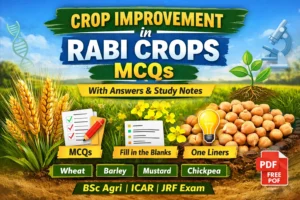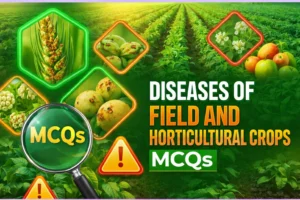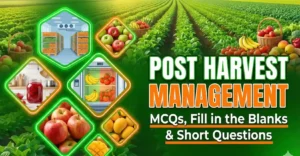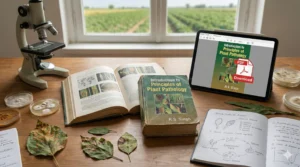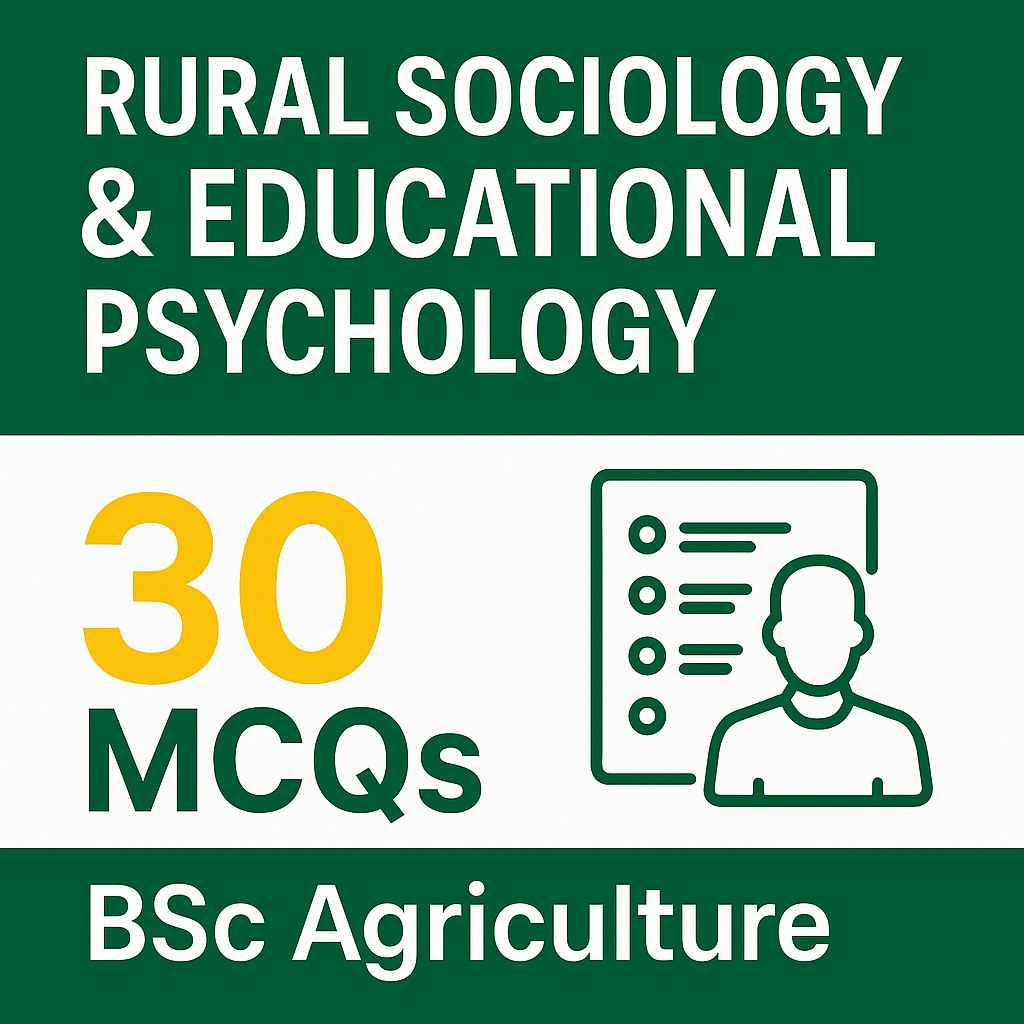
"Rural Sociology & Educational Psychology MCQs with Explanations for BSc Agriculture"
In this blog, we bring you 30 carefully curated MCQs from the subject “Rural Sociology & Educational Psychology,” strictly based on the latest 6th Dean Committee syllabus for B.Sc. Agriculture 1st semester.
Each question is designed with a deep understanding of the syllabus, exam pattern, and conceptual clarity in mind. After every question, you’ll get a detailed, student-friendly explanation to help you not just memorize answers but truly understand the subject.
This set includes a mix of theoretical, factual, and application-based questions — ideal for semester exams, ICAR entrance, and competitive agriculture exams like AFO, NABARD, and more.
📚 Let’s start exploring rural society, social behavior, psychology, and learning processes through MCQs that make revision fun and effective!
Rural Sociology & Educational Psychology MCQs with Explanations PDF Download
Q.1 What is the primary goal of Agricultural Extension?
a) Increase government revenue
b) Promote export of crops
c) Transfer useful agricultural knowledge to farmers
d) Build agricultural colleges in villages
📝 Additional Information
Agricultural Extension is like a bridge between agricultural science and farmers.
Its main aim is to educate farmers using scientific methods, so they can improve their yield, income, and quality of life.
It involves:
Transferring new technology
Teaching best farming practices
Solving field-level problems
👉 That’s why “knowledge transfer to farmers” is its primary goal.
Q.2 Who is considered the “Father of Extension Education” in India?
a) Mahatma Gandhi
b) Dr. K.N. Singh
c) Dr. J.P. Leagans
d) Dr. S.R. Ranganathan
📝 Additional Information
Dr. J.P. Leagans gave a structured definition of extension education and laid down the principles for planning extension programmes in agriculture.
He played a key role in formalizing extension as a discipline.
👉 So, in Indian agricultural context, Dr. J.P. Leagans is widely known as the father figure of this field.
Q.3 Which of the following best defines Sociology?
a) Study of laws
b) Study of ancient cultures
c) Study of human society and social behaviour
d) Study of physical environment
📝 Additional Information
Sociology is the scientific study of society, social relationships, behaviour patterns, customs, and institutions.
It helps us understand
How people live and interact
How traditions and values shape behaviour
How change occurs in communities
👉 It’s important in extension because we deal with rural people and their behaviour.
Q.4 Which branch of sociology specifically focuses on the problems and behavior of rural communities?
a) Political sociology
b) Urban sociology
c) Rural sociology
d) Industrial sociology
📝 Additional Information
Rural Sociology is a specialized branch that focuses on:
Village communities
Farmer behavior
Rural problems (like illiteracy, unemployment)
Family patterns, caste, customs, etc.
It helps extension workers design programmes that match rural culture.
👉 So, if your work is village-focused, Rural Sociology is your toolkit.
Q.5 How is Rural Sociology connected to Agricultural Extension?
a) Helps understand crop varieties
b) Teaches pesticide usage
c) Helps understand rural people’s mindset and customs
d) Provides information on weather
📝 Additional Information
Extension agents work with rural people — and to work effectively, they must understand:
Customs, taboos, values, beliefs
Caste structure, leadership style
Group behavior and traditions
All of this knowledge comes from Rural Sociology, which supports better communication and adoption of technologies.
👉 In short, “know the people before you teach them” — that’s why rural sociology is essential for extension.
Q.6 Which of the following is NOT a feature of Indian rural society?
a) Joint family system
b) Fast-changing lifestyle
c) Caste-based occupation
d) Close community relationships
📝 Additional Information
Indian rural society is known for being traditional and slow-changing.
Families often live in joint systems
Occupation is often caste-based (like potters, weavers, farmers)
People have strong personal bonds with their neighbors and relatives
In contrast, fast lifestyle changes are more common in urban areas.
👉 So, “fast-changing lifestyle” is not a rural feature.
Q.7 Which one of the following correctly describes a major difference between rural and urban society?
a) Urban society has more religious customs
b) Rural society has more industrialization
c) Urban society has more formal social relationships
d) Rural society has more population density
📝 Additional Information
In urban areas, relationships are often formal and professional, based on work, institutions, and temporary needs.
In rural areas, people know each other personally — bonds are emotional and long-term.
Also:
Urban = more industries, more density
Rural = agriculture-based, less density
👉 So, biggest difference = formality of relationships.
Q.8 What is the correct definition of a social group?
a) People living in one building
b) People with similar mobile numbers
c) Two or more individuals interacting and sharing common interests
d) Students sitting silently in a class
📝 Additional Information
A social group is when two or more people:
Interact with each other
Share some common interests
Have a sense of belonging
Example: farmer clubs, SHGs, youth groups, women’s organizations.
Just sitting together doesn’t make a group; interaction + shared purpose is necessary.
👉 So, common interest + interaction = real social group.
Q.9 Which factor does not influence the formation of a social group?
a) Common goals
b) Language similarity
c) Same education qualification
d) Mutual understanding
📝 Additional Information
Social groups are formed based on:
Shared interests or problems
Similar values or goals
Comfort in communication (like language)
Trust and mutual understanding
Education level may vary, but that doesn’t stop people from forming a group — especially in rural areas.
👉 So, similar education is not necessary for group formation.
Q.10 What is one major role of social groups in Agricultural Extension?
a) Avoiding communication
b) Increasing caste division
c) Supporting collective learning and action
d) Replacing extension officers
📝 Additional Information
Social groups like Farmer Clubs, SHGs, Cooperatives are powerful tools in extension.
They help in:
Spreading innovations faster
Training many people at once
Creating motivation through peer influence
Taking joint decisions and action
👉 That’s why extension workers always work with groups, not just individuals.
Q.11 What is social stratification?
a) Equal distribution of wealth
b) Arrangement of people in social layers based on status
c) Changing one’s religion
d) Urbanization of villages
📝 Additional Information
Social stratification means dividing society into hierarchical layers or classes based on factors like:
Wealth
Occupation
Education
Caste
It helps us understand social structure and how people interact within a society.
👉 Think of it as the “social ladder” — some are on the top, some below.
Q.12 Which one of the following is NOT a difference between class and caste system?
a) Caste is birth-based; class is achievement-based
b) The class system is more flexible than caste
c) The caste system allows easy upward movement
d) Class depends on economic status
📝 Additional Information
Caste = fixed by birth, and movement is restricted
Class = depends on achievements or income (e.g., a poor person can become rich)
Caste is rigid, class is flexible
👉 So, caste system does not allow easy upward movement — that’s the incorrect statement here.
Q.13 Folkways are:
a) Strict laws
b) Social customs with mild reaction if broken
c) Rituals performed only by priests
d) Traditions requiring government approval
📝 Additional Information
Folkways are everyday practices that people follow naturally — like how to greet elders, what to wear, how to eat.
They are not laws, but if you break them, people may look down on you or gossip — that’s all.
👉 So, they are socially accepted ways of doing things, but not legally enforced.
Q.14 Taboo refers to:
a) A tradition followed by kings only
b) A social custom that is strongly forbidden
c) A festival held in temples
d) A new political rule
📝 Additional Information
A taboo is something that a society strictly prohibits, often due to religious or moral reasons.
Examples:
Eating beef in Hindu culture
Marrying within the same gotra in many communities
Breaking a taboo = strong negative reaction from society.
👉 So, taboos are non-negotiable cultural boundaries.
Q.15 Which of the following best defines social values?
a) Price of goods in society
b) Government orders for society
c) Shared beliefs about what is good or bad
d) Farming practices taught by extension workers
📝 Additional Information
Social values are the moral compass of a society — they guide what is right, wrong, acceptable, or shameful.
For example:
Respecting elders
Helping neighbors
Speaking truth
Extension workers should understand local values, so their messages match community thinking.
👉 Jab value samjhe bina kaam karte ho, tab resistance milta hai.
Q.16 Which of the following is not a social institution in rural society?
a) Family
b) Agriculture office
c) Religion
d) Education
📝 Additional Information
Social institutions are well-established systems that organise behaviour in society, like:
Family (marriage, parenting)
Religion (beliefs, rituals)
Education (knowledge transfer)
The agriculture office is an administrative setup, not a core institution that shapes society across generations.
👉 So, option (b) is not considered a social institution.
Q.17 Social organizations are different from institutions because they:
a) Don’t have any formal rules
b) Are temporary setups only
c) Are groups of people formed to achieve common goals
d) Work without leadership
📝 Additional Information
Social organizations = structured groups like cooperatives, SHGs, youth clubs, Mahila Mandals, etc.
They are formed with clear goals — like savings, training, farming awareness.
While institutions are broad and long-lasting, organizations are more goal-specific and functional.
👉 Social organizations = action-oriented groups with purpose.
Q.18 What is the main purpose of social control in a society?
a) To increase population
b) To protect criminals
c) To maintain order and discipline
d) To promote wars
📝 Additional Information
Social control refers to the rules and systems that keep society stable.
It helps prevent:
Anti-social behavior
Crime
Disrespect of customs or rules
Means of social control:
Religion, education, law, traditions, public opinion
👉 Without social control, society becomes chaotic.
Q.19 Which of the following is an informal means of social control?
a) Law
b) Court judgment
c) Gossip
d) Police action
📝 Additional Information
Informal control works without legal force, but still influences behavior.
Example:Gossip in villages can stop someone from breaking social rules
Praise/blame can change actions
Formal controls = Law, Police, Courts
👉 Gossip = powerful rural tool to keep people in line — without any police!
Upcoming agriculture exams 2025
Q.20 Which one of the following is not a cause of social change in rural society?
a) Education
b) Technology
c) Superstition
d) Transportation
📝 Additional Information
Social change refers to modifications in habits, customs, beliefs, and relationships.
It is caused by:Education (new thinking)
Technology (new tools, farming)
Transport & Communication (exposure)
Superstition holds society back — it resists change, not causes it.
👉 So, superstition = obstacle, not driver of change.
Q.21 Which of the following is not a type of leadership?
a) Autocratic
b) Democratic
c) Laissez-faire
d) Individualistic
📝 Additional Information
Leadership is classified into types based on how a leader functions:
Autocratic – takes decisions alone
Democratic – takes team’s opinion
Laissez-faire – leaves group free to decide
But “individualistic” is a personal trait, not a recognized leadership style in extension education.
👉 So, it doesn’t belong to this category.
Q.22 Which of the following is a commonly used method to select lay leaders in rural areas?
a) Board exam
b) Field visit and observation
c) Multiple-choice written test
d) Government nomination
📝 Additional Information
Lay leaders (non-professionals like progressive farmers, youth leaders) are selected based on:
Community respect
Local influence
Willingness to help
So, extension workers do field visits, observe behavior, and take community feedback.
👉 Practical observation > written test in rural leadership.
Q.23 What is the main advantage of training local leaders in agricultural extension?
a) To reduce government jobs
b) To promote city farming
c) To improve community trust and message spread
d) To replace scientists
📝 Additional Information
When local leaders are trained:
Messages are accepted faster
Farmers trust someone they know
Communication becomes two-way
The adoption rate of new technology improves
👉 Local leaders act as messengers and motivators for extension.
Q.24 Educational psychology helps extension workers by:
a) Giving fertilizer recommendations
b) Helping understand how people learn
c) Telling exact seed rate
d) Teaching weather forecast methods
📝 Additional Information
Educational psychology deals with:
How people learn
What motivates them
How to handle resistance to change
How to make training effective
👉 It helps extension agents design better teaching methods based on rural learning behavior.
Q.25 Which factor does not influence intelligence of a person?
a) Heredity
b) Environment
c) Physical health
d) Shoe size
📝 Additional Information
Intelligence is influenced by:
Heredity (genes)
Environment (home, education)
Health (nutrition, brain development)
Shoe size has nothing to do with brain function or intelligence — it’s completely irrelevant.
👉 So, it’s clearly not a factor in intelligence development.
Q.26 Which of the following best defines personality in the context of educational psychology?
a) A person’s height and weight
b) The emotional and behavioral traits of a person
c) A person’s knowledge of farming
d) The ability to earn money
📝 Additional Information
Personality includes how a person thinks, feels, and behaves in different situations.
It’s shaped by:Heredity (genes)
Environment (family, society)
Experiences (education, failures)
👉 In agricultural extension, personality affects how a farmer accepts change, takes decisions, and leads others.
Q.27 Which of the following is a type of personality as per educational psychology?
a) Practical
b) Introvert
c) Economic
d) Creative
📝 Additional Information
Educational psychology classifies personalities as
Introvert—shy, quiet, reserved
Extrovert—outgoing, expressive
Ambivert – mix of both
Introverted people may take longer to adopt new ideas, while extroverted people may become village influencers.
👉 Knowing personality type helps extension agents to communicate effectively
Q.28 Which one is not a part of teaching-learning process?
a) Learning situation
b) Learning experience
c) Gossip and rumours
d) Teaching methods
📝 Additional Information
A complete teaching-learning setup includes:
A teacher or trainer
A learner
A learning situation (classroom, farm, demo)
Learning experience (hands-on, visuals, lectures)
Teaching methods (charts, group discussion, field visit)
Gossip is not part of learning — it misleads rather than educates.
👉 Extension ka focus = effective learning, not distraction.
Q.29 Which of these is an essential element of a learning situation?
a) Only blackboard
b) Only the textbook
c) Teacher, learner, content, environment
d) Weather forecast
📝 Additional Information
A good learning setup needs:
A motivated teacher
An active learner
Meaningful content
Right environment (calm, safe, resourceful)
Q.30 Which of the following is a principle of learning?
a) Learning happens only in school
b) Learning is always boring
c) Learning occurs when there is interest and need
d) Learning needs no repetition
📝 Additional Information
Some key principles of learning are:
Readiness – learner must be mentally prepared
Interest & Need – learner must see value
Practice & Repetition – helps retention
Feedback – reinforces correct behavior
Download most common agricultural exams syllabus.
Latest Syllabus | Download Here |
IBPS Agriculture Filed Officer | |
NABARD GRADE A | |
Food Corporation of India (FCI) | |
RAEO | |
RHEO | |
Food Inspector | |
IFFCO AGT | |
MP PAT | |
UPSSSC AGTA |
Conclusion: Rural Sociology & Educational Psychology MCQs with Explanations for BSc Agriculture"
You’ve just completed 30 powerful MCQs from Rural Sociology & Educational Psychology, each one explained in a way that’s simple, relevant, and exam-focused.
We hope this blog helped you.
Understand key concepts from your syllabus
Learn how to apply theories in real-life extension work
Strengthen your preparation for both academic and competitive exams
👉 Keep practicing, keep revising—because smart study = better results.
If you found this MCQ set useful, don’t forget to explore our other subjects from the B.Sc. Agriculture 1st Semester MCQ series only on AgriGramodaya.com 🚀
📩 Have suggestions or topic requests? Comment below or reach out via our contact page — we’d love to hear from you!
Click to Join Our Free WhatsApp Group and YouTube for Agriculture Updates!
Get daily updates, free study material, and the latest schemes, and connect with other agriculture students and farmers.
Latest post
👉Top 100 Crop Improvement in Rabi Crops MCQs + Fill in Blanks + One Liners (Exam Special)
Crop improvement in rabi crops MCQs is one of the...
Read More👉 Diseases of Field and Horticultural Crops MCQs True/False, fill in the blanks (With Answers for BSc Agriculture)
Diseases of field and horticultural crops are one of the...
Read More80+ Post Harvest Management MCQs, Fill in the Blanks & Short Questions (Exam-Oriented)
Post harvest management is one of the most important units...
Read MoreR.S. Singh Plant Diseases Book PDF: The “Gift” for Plant Pathology Students
Table of Contents If you are a BSc Agriculture student,...
Read MoreNemraj Sunda 15th Edition PDF Download Free : Is It Still the Ultimate Guide for Agri-Exams?
Table of Contents If you have ever stepped into an...
Read MoreFundamentals of Genetics by B.D. Singh Book PDF: A Comprehensive Review & Why It’s a Must-Have for Agri Students
Let’s be honest for a second—when most of us join...
Read More🙋♂️ About the Author
Khumesh, a BSc Agriculture student and founder of AgriGramodaya.com, is on a mission to make Rural Sociology & Educational Psychology MCQs the easiest and most accessible subject for students across India.
Having personally faced the challenge of finding clear, structured, and visual content for horticulture, he decided to build a complete one-page resource, breaking down the full syllabus into simple parts — supported by PPTs, summary notes, previous-year MCQs, and exam-oriented insights.
Every part of this subject is designed to help students from zero to advanced level, whether you’re preparing for semester exams or agriculture job exams.
📚 Learn visually. Revise smartly. Succeed confidently — only on AgriGramodaya.

